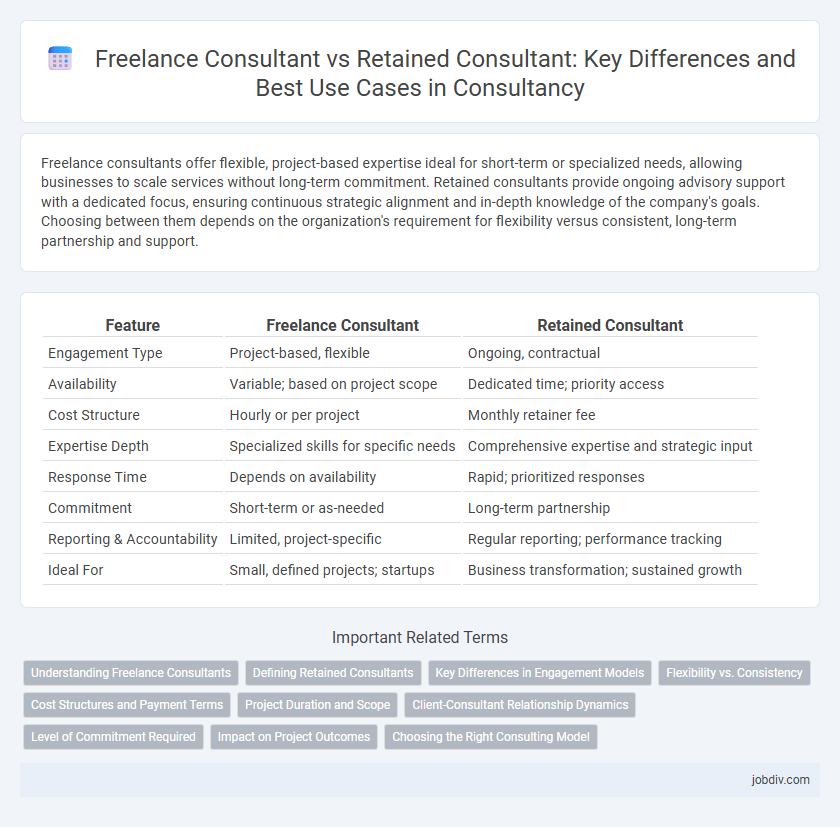Freelance consultants offer flexible, project-based expertise ideal for short-term or specialized needs, allowing businesses to scale services without long-term commitment. Retained consultants provide ongoing advisory support with a dedicated focus, ensuring continuous strategic alignment and in-depth knowledge of the company's goals. Choosing between them depends on the organization's requirement for flexibility versus consistent, long-term partnership and support.
Table of Comparison
| Feature | Freelance Consultant | Retained Consultant |
|---|---|---|
| Engagement Type | Project-based, flexible | Ongoing, contractual |
| Availability | Variable; based on project scope | Dedicated time; priority access |
| Cost Structure | Hourly or per project | Monthly retainer fee |
| Expertise Depth | Specialized skills for specific needs | Comprehensive expertise and strategic input |
| Response Time | Depends on availability | Rapid; prioritized responses |
| Commitment | Short-term or as-needed | Long-term partnership |
| Reporting & Accountability | Limited, project-specific | Regular reporting; performance tracking |
| Ideal For | Small, defined projects; startups | Business transformation; sustained growth |
Understanding Freelance Consultants
Freelance consultants offer specialized expertise on a project-by-project basis, allowing businesses to access flexible, cost-effective solutions without long-term commitments. Unlike retained consultants who maintain ongoing advisory roles, freelance consultants provide targeted insights tailored to specific challenges or goals. Their adaptability and diverse experience make freelance consultants ideal for companies seeking immediate, focused support in dynamic environments.
Defining Retained Consultants
Retained consultants are experts engaged on a long-term basis through a formal agreement, providing consistent advisory support tailored to the client's ongoing strategic needs. Unlike freelance consultants who work on a project-by-project basis, retained consultants deliver continuous value by deeply understanding the organization's goals and challenges. Their services often include proactive problem-solving, regular performance evaluations, and alignment with corporate objectives, ensuring sustained impact and trusted partnership.
Key Differences in Engagement Models
Freelance consultants typically engage on a project-by-project basis, offering flexibility and specialized expertise without long-term commitments, whereas retained consultants maintain an ongoing relationship with clients, providing continuous strategic advice for a fixed retainer fee. The freelance model favors short-term, clearly defined deliverables and variable availability, while the retained model supports consistent access and deeper integration into the client's business operations. Cost structures also differ, with freelancers often charging hourly or per project rates, compared to retained consultants who bill monthly or quarterly retainers for sustained service.
Flexibility vs. Consistency
Freelance consultants offer unmatched flexibility by adapting quickly to project demands and working varying hours without long-term commitments, ideal for dynamic or short-term needs. Retained consultants provide consistency through dedicated availability, strategic continuity, and deeper organizational integration, ensuring sustained focus and reliable expertise over time. Choosing between freelance and retained consultants depends on whether a business prioritizes adaptable support or steady, ongoing advisory relationships.
Cost Structures and Payment Terms
Freelance consultants typically charge on an hourly or project basis, offering flexible payment terms tailored to specific deliverables, which can result in lower upfront costs but less predictable expenses over time. Retained consultants usually operate under a fixed monthly or quarterly fee arrangement, providing ongoing advisory services and prioritized access, which often leads to higher but more stable and budgeted costs. Understanding these cost structures and payment terms is crucial for organizations aiming to balance budget control with the level of consultancy engagement required.
Project Duration and Scope
Freelance consultants typically handle short-term, specific projects with clearly defined scopes, offering flexibility and cost-efficiency for businesses needing specialized expertise on an as-needed basis. Retained consultants engage in long-term partnerships, providing ongoing advisory services across broad strategic initiatives that require continuous input and deeper organizational understanding. Project duration and scope directly influence the choice between freelance and retained consultants, with shorter, focused tasks favoring freelancers and extended, complex endeavors benefiting from retained arrangements.
Client-Consultant Relationship Dynamics
Freelance consultants engage with clients on a project-by-project basis, offering flexibility and specialized expertise without long-term commitment, which fosters dynamic but transactional relationships. Retained consultants provide ongoing advisory services under a continuous contract, ensuring deeper integration, trust, and alignment with the client's strategic goals. The client-consultant relationship with retained consultants tends to be more collaborative and proactive, while freelance consultants often focus on delivering targeted solutions efficiently within defined scopes.
Level of Commitment Required
Freelance consultants offer flexibility and work on specific projects without long-term obligations, making them ideal for businesses needing specialized expertise on an as-needed basis. Retained consultants demand a higher level of commitment, providing ongoing advisory services and strategic support through continuous engagement agreements. This sustained involvement allows retained consultants to deeply integrate into the organizational context, resulting in higher accountability and consistent access to expert guidance.
Impact on Project Outcomes
Freelance consultants offer flexibility and specialized expertise on a project-by-project basis, often driving innovation and rapid problem-solving tailored to specific challenges. Retained consultants provide continuous support and in-depth organizational knowledge, fostering long-term strategic alignment and sustained project success. Both models influence project outcomes through different engagement durations and levels of integration with the client's team.
Choosing the Right Consulting Model
Freelance consultants offer flexible, project-based expertise ideal for short-term needs or specific skill gaps, enabling businesses to scale consulting support dynamically. Retained consultants provide ongoing, strategic advisory services with guaranteed availability, fostering long-term partnerships and deeper organizational insights. Choosing the right consulting model depends on budget, project scope, desired engagement duration, and the level of continuous support required.
Freelance Consultant vs Retained Consultant Infographic

 jobdiv.com
jobdiv.com